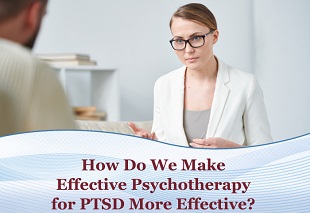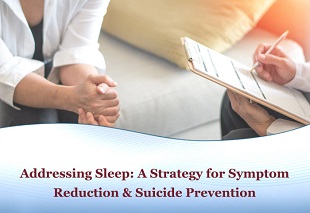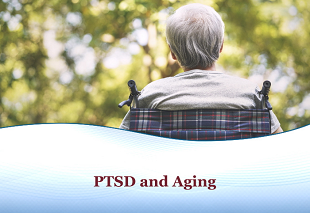Continuing Education
Continuing Education
This section brings together free in-depth Continuing Education resources for the Professional community concerned with trauma.

- Date Created: 10/ 8/2020
- Time to Complete: 1 hour
- Credits: ANCC, APA, ASWB, ACCME, Other Orgs
- Skill Level: Intermediate
- Course Series: PTSD 101
2017 VA/DoD Clinical Practice Guideline for PTSD recommends evidence-based, trauma-focused psychotherapies as first-line treatment for PTSD. Emerging research is demonstrating support for the acceptability, feasibility and effectiveness of delivering evidence-based psychotherapy (EBP) for PTSD in a massed model. Studies examining more intensive massed models suggest higher treatment retention, treatment completion and reduced likelihood of avoidance.
This course reviews the research supporting massed PTSD treatment models and implementation considerations within a VA PTSD Clinical Team.
View Course Details »
- Date Created: 10/ 8/2020
- Time to Complete: 1 hour
- Credits: ANCC, APA, ASWB, ACCME, Other Orgs
- Skill Level: Intermediate
- Course Series: PTSD 101
Knowledge of the methodological considerations for interpreting the scientific literature on psychotherapy is important for developing recommendations for evidence-based care. This course reviews the 2017 VA/DoD Clinical Practice Guideline recommendations and provides an overview of the relative effectiveness, dropout rates and remission rates of PTSD treatments compared to other disorders (e.g., depression).
In addition to listing areas of emerging science in PTSD psychotherapy, this course offers potential strategies for enhancing treatment effectiveness.

- Date Created: 10/ 6/2020
- Time to Complete: 1 hour
- Credits: ANCC, APA, ASWB, ACCME, Other Orgs
- Skill Level: Intermediate
- Course Series: PTSD 101
Insomnia symptoms may be associated with increased symptoms of PTSD and depression and associated with increased suicidal ideation.
This course reviews the impact of sleep disturbances on medical and psychiatric concerns and provides an overview of treatments for insomnia, including a comparison of Cognitive Behavioral Therapy for Insomnia (CBT-I) and sedative-hypnotic medications. The author also presents research supporting the benefits of CBT-I for pain management, PTSD, depression and suicide prevention.
View Course Details »
- Date Created: 10/ 5/2020
- Time to Complete: 1 hour
- Credits: ANCC, APA, ASWB, ACCME, Other Orgs
- Skill Level: Intermediate
- Course Series: PTSD 101
Older adults with PTSD face unique challenges with co-occurring physical and mental health problems in addition to cognitive decline. Age-related factors can interact with PTSD and associated problems in ways that carry implications for research and clinical care.
This course reviews the epidemiology of PTSD in older adults and describes the role of aging and cognitive impairment among older patients. The author presents recommendations and cautions for assessment and treatment in older adults with PTSD. Potential next steps for research are also discussed.
View Course Details »
- Date Created: 10/ 5/2020
- Time to Complete: 1 hour
- Credits: ANCC, APA, ASWB, ACCME, Other Orgs
- Skill Level: Basic
- Course Series: PTSD 101
PTSD is different from other psychological disorders because it has a known etiology, a traumatic event. This overview course provides a detailed description of the DSM-5 diagnostic criteria, risk factors and evidence-based treatments for PTSD.
This course includes video clips of Veterans describing their PTSD symptoms and clinicians explaining first-line treatment approaches, including Prolonged Exposure (PE) and Cognitive Processing Therapy (CPT). Links to free resources for patients and providers are included.
View Course Details »
- Date Created: 09/25/2020
- Time to Complete: 1 hour
- Credits: ANCC, APA, ASWB, ACCME, Other Orgs
- Skill Level: Intermediate
- Course Series: PTSD 101
Written Exposure Therapy (WET) is a brief, 5-session exposure-based psychotherapy for PTSD that is recommended by the VA/DoD Clinical Practice Guideline. WET differs from other trauma-focused psychotherapies in its cost-efficiency and low treatment drop out.
This course reviews the theoretical mechanisms and development of WET, presenting the supporting and on-going research for WET as an evidence-based treatment for PTSD. The authors provide a comprehensive description of the WET protocol and its delivery and describe the type of patient who would be a good candidate.
View Course Details »
























